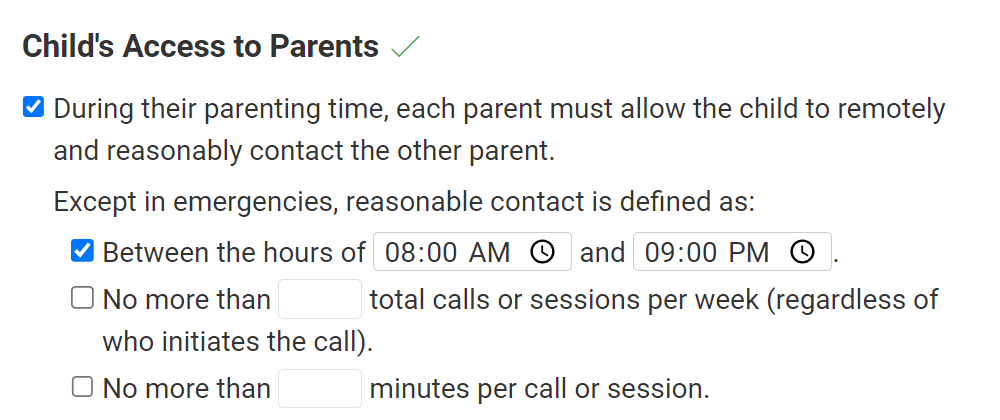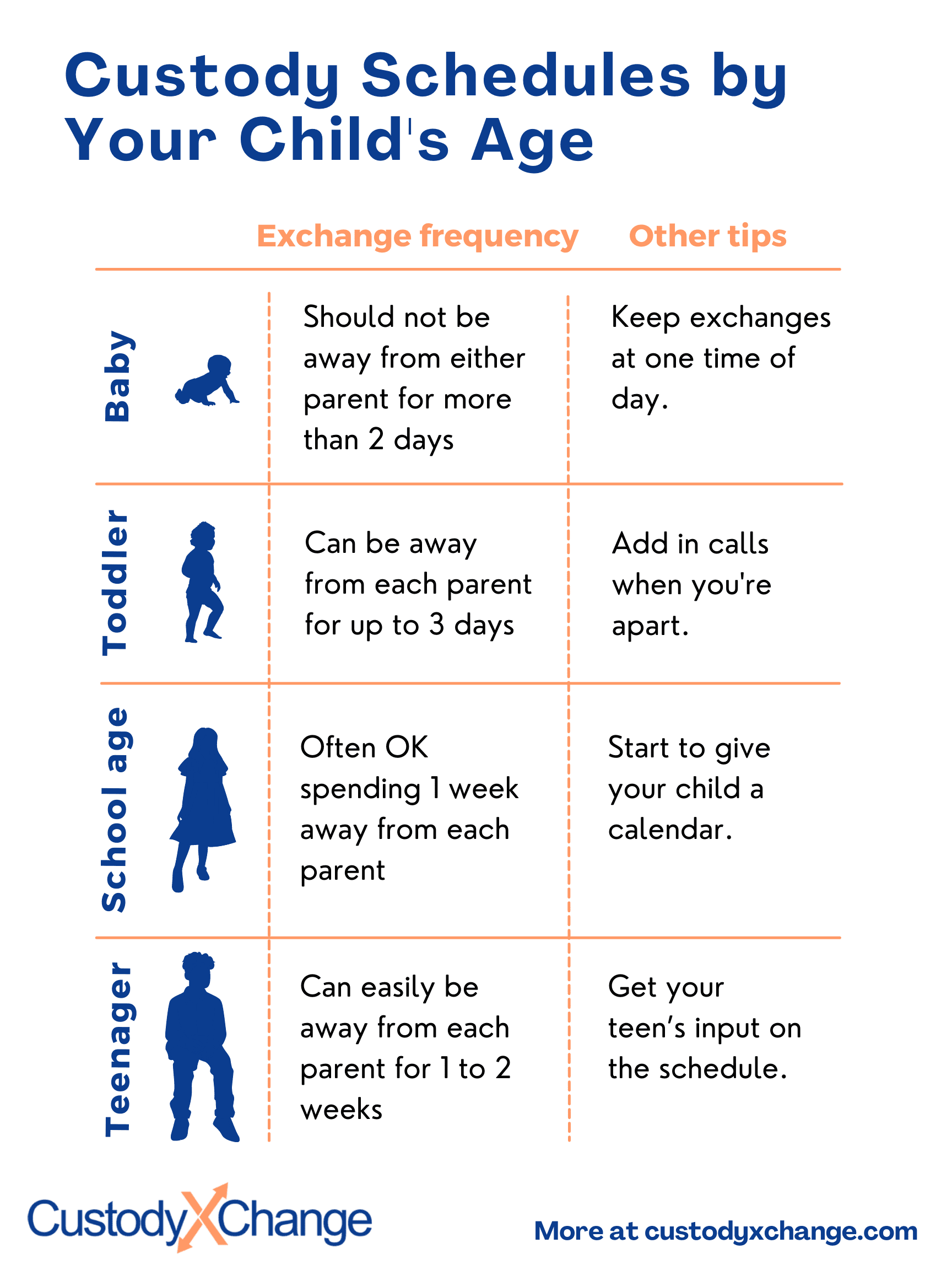Toddler Parenting Plans and Custody Schedules
(18 months to 3 years)
A toddler parenting plan has all of the information of a basic parenting plan but it is customized to fit the unique needs of a toddler (18 months to 3 years).
Things to know before creating a toddler parenting plan
Here are some things you need to know about toddlers to make your parenting plan more effective.
- Toddlers do well with predictable schedules. Your plan should allow your toddler to consistently see each parent and should also allow your toddler to keep a stable routine.
- Toddlers are very curious and develop new physical skills constantly. Each parent should childproof the home so it is safe for the toddler to spend time there.
- Toddlers have strong attachments to caregivers. Toddlers are attached to each parent and your plan should allow your toddler to have frequent and continuing contact with both parents.
- Toddlers are sensitive to tension and anger. Your plan needs to provide a way for parents to work out disagreements so that your toddler isn't around conflict.
- Toddlers grow and develop rapidly. You should have ways to modify and change your plan as your toddler gets older.
Many toddlers are fearful of change and have difficulty with transitions between the parents' homes. Your plan can include provisions about exchanges and drop offs so they aren't upsetting for your toddler. A common provision is that the parent the toddler is with drops the child off at the other parent's house.
Toddlers remember events and people and they may miss the parent who isn't with them. You can include a provision in your plan for a daily (or frequent) telephone call from the parent who isn't with the toddler. You can also have pictures of the other parent in the toddler's bedroom.
 You can customize this with Custody X Change.
You can customize this with Custody X Change.
Making a custody schedule for a toddler
Your custody schedule should give your toddler frequent contact with both parents and provide both parents opportunities to feed, bathe, play with, read to, arrange playdates for, and put the toddler to sleep. Toddlers can be away from either parent for 2 or 3 days.
Here is an example of a typical visitation schedule for a toddler. Each parent has several overnights and the weekend time is split.
 You can customize this with Custody X Change.
You can customize this with Custody X Change.
When both parents work and the toddler is in daycare, a common schedule is for the parents to split the weekend and for both parents to have overnight visits.
 You can customize this with Custody X Change.
You can customize this with Custody X Change.
A 2-2-3 schedule can work well for a toddler if the parents live close to each other.
 You can customize this with Custody X Change.
You can customize this with Custody X Change.
The following schedules can also work for a toddler:
- Alternating every 2 days schedule where your toddler alternates spending 2 days with each parent.
- 5-2 schedule where your toddler spends 5 days with one parent and 2 days with the other parent. You may want to include midweek visits with this schedule.
- Every 3rd day schedule where your toddler spends every 3rd day with the nonresidential parent.
- 4-3 schedule or a 3-4-4-3 schedule where your toddler spends 4 days with one parent and 3 days with the other parent.
- Every extended weekend schedule or every weekend schedule where your toddler spends the week with one parent and weekend time with the other parent. You may want to include a midweek or overnight visit during the week.
As you think about the schedule for your toddler you need to consider the amount of childcare each parent provided before the separation and your child's temperament. You also need to consider how close the parents live to each other.
If one parent hasn't been involved in taking care of the toddler and wants to start being involved you can start with a schedule that gives the parent 2 or 3 midweek visits of several hours. Once the parent is more comfortable with caregiving skills you can add an overnight visit and increase the length or number of other visits.
You can make a holiday schedule for your toddler that includes the holidays you and the other parent want to celebrate. Each parent should have about the same amount of holiday time.

Development from 18 months to 3 years
Understanding some of the development of toddlers 18 months to 3 years can help you make a better parenting plan and custody schedule.
Toddlers have strong attachments to parents and caregivers. They may be fearful of separation and change. It is normal for a toddler to cry or be upset during an exchange and it doesn't mean the other parent has done something wrong.
Toddlers are becoming more aware of the world and they are becoming more independent. They may say the word "no" a lot and they may be demanding. They are able to respond to different parenting styles and adapt.
Toddlers are able to remember recent events and people. They are particularly sensitive to tension, anger and violence and will notice conflict.
Toddlers do well with a lot of interaction and play with their parents. They will start to become more involved in play and will start imaginary play. Parents can read to their toddlers and play games with them. They become more interested in playing with other children.
Toddlers have rapid growth and change during this time. Here are some of the ways they develop:
- Physically: running, climbing, going up and down stairs, kicking a ball, potty training, learning to dress themselves
- Emotionally: expressing independence, expressing preferences, tantrums, learning to express how they feel
- Socially: talking, more involved in playing, imaginary play, playing with other children, imitating parents and others
Get help with toddler parenting plans and schedules
Creating a plan and schedule on your own can feel overwhelming. You have to be sure to use airtight legal language and can't omit any required information.
The Custody X Change app takes the guesswork out of the equation. It walks you through each step of creating a parenting plan and helps you build a schedule piece by piece.
Try this with Custody X Change.
As a result, you get documents and calendars that meet your family's needs, as well as the court's standards.
For quick, reliable and affordable help making a parenting plan and custody schedule, turn to Custody X Change.
